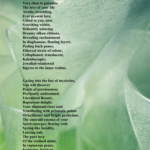The Public Debates
Three men stand together, facing not only unrelenting lights and cameras, but also an uncompromising (yet apparently unconvinced) electorate on national television, and a select studio audience primed with unknown awkward questions. Each man is hopeful, yet desperate; passionate in his way, yet somehow desolate; committed to leading a nation and its people to better times, wanting and needing to be trusted. They are reminiscent in some ways of Moses leading his people to the Promised Land; and if chosen, face a task of similar proportions, given Great Britain’s current financial predicament.
So can we determine who has the power not only to part the metaphorical Red Sea of troubles facing whichever party may win the election, but also has the courage and conviction to lead us to the beckoning shores of safe recovery?
Societal Symbols
The suits are well-cut, the grooming immaculate – the outer face of British political leadership perhaps differentiated only by the colour of a tie and the type of knot with which it is carefully arranged…and I can’t help feeling those ties in some way stifle the true being that is striving to bring his message to the British people. Do these silky symbols of belonging to a certain sector of society actually cut off the connection between their heads and their hearts? Are they really feeling what the people want – or are they too ‘prepped’ and primped, too slickly coached and chivvied into being what their advisors and publicity teams think the public wants?
Would we have preferred to see the debates as a ‘loosen the tie, roll up the sleeves and let’s get to work and tackle the challenges we’re facing’ honest to goodness, humble attempt to offer solutions, in contrast to the interminable point scoring put-downs that, frankly, have left me bored and irritated that not one of them came across as being a totally worthy contender? Although the polls give it to Cameron for last night’s debate, there’s still a very mixed response out there.
Understanding Change
I wanted David Cameron to be what I’ve seen and heard him do in the past. I was at the CBI conference in 2006 when he delivered a powerful speech that won over the 1,000-strong audience of top business leaders. He had a bold, clear message that won hearts and minds – and the leadership of his party. In 2008 at Leaders in London he again delivered a moving speech. Articulate, humorous, flowing naturally and comfortable in his skin – he was truly convincing. Now of course, there’s more at stake – there’s more at stake for all of us – it’s a time when a clear bold plan and a big heart can win the day.
David, are you listening? At Leaders in London you said – “don’t try and be something that you’re not”. Look at these words again – “politics is about understanding what’s happening in your country… politicians don’t win just because they’ve got the best slogans… winning in politics is about understanding the forces of change and responding to that problem.” Do you still hold that as true?
Pause, Reflect, Listen
This week we saw the rawness of Gordon Brown as he (inadvertently) publicly expressed his private sense of discomfiture at Gillian Duffy’s comments and questions – that was an honest, visceral , if shocking response – and in the true sense of the word ‘bigot’, (Spectator) he may have had a point. It was careless, it seemed hypocritical, it displayed lack of understanding – it was an unfortunate insight into the concerns that constant media pressure and polls place on leaders. The most important thing in that moment was not the voter, nor the woman, but the irritation of being faced with a sensitive issue – immigration – and how the encounter might influence the overall outcome. Maybe Gillian Duffy’s comments, outside the arena of political correctness, expressed a side of public opinion that is not politically or publicly acceptable, but is it pervasive in private? Is it pervasive in Lancashire, a Labour heartland and my own home county. A Rochdale pensioner’s concern about the extra stress placed on already scarce resources by increases in population might have hit a raw nerve, and may even be representative of floating voter’s opinions – who knows? Brown was flustered and discomfited, and that’s not statesmanlike behaviour.
It was a big diference from the time in late 2008 when I heard and saw him speak to an audience of committed innovative social entrepreneurs and activists at the Chain Reaction event, pledging help and support for new business – again, now there’s more at stake, events have unfolded which have undermined those positive commitments and the excitement of his young ambassadors telling their stories.
Gordon needs to learn to pause, reflect, listen – carefully – and not react – Gordon, are you listening?
Crucial Floating Voters
As for Nick Clegg, his policies and views might well represent a new way, a different outcome, ‘real’ change – but to me it seems like there is game playing, and the boyish charm which is undoubtedly appealing perhaps doesn’t present the mature gravitas that needs to be there for those crucial floating voters to be really convinced. I’ve more experience of hearing Vince Cable who is the epitome of informed enthusiasm and passion for a fairer economy and society – tempered by wisdom and his being ‘seasoned’.
Statesmanlike Qualities
I don’t really want a ‘politician’ as the country’s leader; I want a Statesman. Someone with dignity, composure, common sense and intelligence – and the intellectual and compassionate, emotional capacity to understand how important it is to stay connected to their people’s needs and wants.
As voters, we’re all small islands who can come together to make change happen – who is going to convince us that their qualities and vision, and their practical abilities to take action, will get us safely to the distant yet achievable shore of sustainable growth and mutual benefit?
What will be the outcome for votes from a Small Island, votes for a Small Island next week?
It’s in our hands…so what kind of leader do we deserve?
(acknowledgement to Bill Bryson and his brilliant ‘Notes from a Small Island‘)



